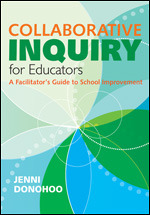Collaborative Inquiry for Educators
A Facilitator's Guide to School Improvement
- Jenni Donohoo - Education Consultant
Data-Driven Decision Making | Professional Learning Communities | Teacher Leadership
Your step-by-step guide to making collaborative inquiry work
Collaborating for improved student outcomes makes sense. But beyond theory, do you know where to begin? How does a team gather, analyze, and then implement and evaluate learning objectives while engaging students and meeting school agendas? Without directed guidance, it’s easier said than done.
Aligned to current Learning Forward standards and based on the latest professional development research, Collaborative Inquiry for Educators deconstructs the collaborative inquiry process. This step-by-step guide gives facilitators tools to move teams toward purposeful, productive, and impactful collaborative work, including
- A clear and concise four-stage model that provides a structure for facilitating successful collaborative inquiry
- Real-world examples from collaborative teams that model components of each stage
- Clear, direct, and practitioner-focused tone with an emphasis on action over theory
Unlock your team’s ability to work together to improve instruction and increase student achievement today!
"Jenni Donohoo's immensely thoughtful and deeply practical discussion of collaborative inquiry helps teachers to live up to, and also be enlivened by, the high standards of evidence-informed judgment that define all true professions."
—Andy Hargreaves, Thomas More Brennan Chair in Education
Boston College
“In clear and unpretentious language, Donohoo guides the reader through a challenging but practical four-step learning sequence so that teachers learn and, subsequently, students achieve—a goal to which we all subscribe and endorse.”
—Shirley M. Hord, Scholar Laureate
Learning Forward
"Jenni Donohoo's immensely thoughtful and deeply practical discussion of collaborative inquiry helps teachers to live up to and also be enlivened by the high standards of evidence-informed judgment that define all true professions. Like the world-class facilitator she is, she moves her readers forward with ideas, activities and examples that do not talk down to them or go over their heads. Her book is essential for all leaders, teachers and staff developers, who want to help all their teachers become successful professionals, and who want to be treated like top-notch professionals themselves as they do so."
"Student learning outcomes increase as educators' professional learning contributes to enhanced teaching quality. The most powerful strategy and structure for this dynamic is the professional learning community (PLC) and in the PLC context, adult learning results from the collaborative inquiry of the participants. The author of this significant guide to facilitating collaborative inquiry has created a compelling vision of such inquiry and the professional learning that develops from it. In clear and unpretentious language, Donohoo guides the user through a challenging but practical four-step learning sequence so that teachers learn and subsequently, students achieve--a goal to which we all subscribe and endorse."
"Donohoo provides a practical and powerful four-step process to guide collaborative inquiry teams in identifying, inventing, and investigating solutions to problems of practice that occur in their everyday work. The tools, examples, and detailed guidelines provide teacher leaders, coaches, principals, and others with the resources they need to transform unproductive team meetings into evidence-based interactions and study that result in improved practice and results for students."
"Donohoo has provided a rare gift in a book that one can read forwards, backwards, or in the middle. You can pinpoint your need, save time, and make immediate use of this excellent resource. The references are extensive and current. At the back of the book the reader finds eleven enormously practical and immediately applicable resources—analytical frameworks and thought-provoking questions that you can use the first time you read the text. The chapters include compelling evidence and practical advice, but it's too easy for readers to dismiss the last pages of a book. Don't make that mistake with this immensely useful and practical volume."
"Collaborative Inquiry for Educators provides a balance of conceptual knowledge and pragmatic next steps. Perfect for a grade level or department chair."
"Jenni Donohoo’s book articulates in detail what facilitation needs to look like, along with how to create the conditions to actually make it happen. It is a must read for anyone trying to actively develop and support the link between teacher and leader actions, and positive student outcomes."
"Often educational organizations engage in 'hot topic' practices, but not always with knowledge of how to effectively do so. Jenni Donohoo provides very clear and explicit grounding for an individual who might be assigned as a facilitator for a collaborative inquiry within a school system. In the spirit of collaborative inquiry, Donohoo recognizes the need for adaptation to different situations and often provides options for facilitators to consider. Grounding this work in the professional learning literature, she does an excellent job of weaving citations from that literature into a guiding manual for how to proceed. I would certainly recommend this resource to facilitators of or participants in a collaborative inquiry as well as to administrators who set up the opportunities for such collaborations."
"This book provides detailed, practical, and well-grounded ideas for those wanting to make professional learning communities work effectively. It’s a fine resource for anyone working with school development or improvement."
"Collaborative Inquiry for Educators is a guide for school leaders who long to move beyond superficial group meetings and into meaningful inquiry that effects actual changes in instruction and student achievement. It provides a timely guide to meeting the expectations of Common Core Standards."
"This resource is a must have for collaborative team facilitators."




